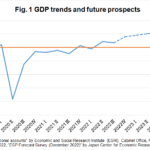“The observation of major global currents shows demand for changes that are not only an extension of the past,” writes Kojima Akira.
The Club of Rome, which sounded the alarm about the sustainability of the global economy, the global environment and resources in a report titled The Limits to Growth, will turn exactly 50 years old this year. Private enterprises that expected growth, and economic organizations and countries that strongly believed in gross domestic product (GDP) as a benchmark of their success in terms of economic growth criticized the limits to growth theory as a theory against economic growth or a zero-growth theory.
However, the Club of Rome is still alive today. The presence of the Club deserves our attention, but we should pay greater attention to the fact that the world has come to recognize the problem of sustainability presented by the Club as a more important and pressing issue. The switch of global values about resources and the environment and the dramatic development of technologies lie behind this change.
Divestment moves for reducing investments in carbon-intensive businesses and achieving a switch to low carbon investments symbolize value changes. During the 2015 United Nations Climate Change Conference (COP21) in Paris, more than 500 organizations, including major banks, financial institutions, foundations, university bodies and public pension funds around the world, decided to withdraw from investments related to fossil fuels. The amount divested by these organizations is said to total 3.4 trillion US dollars.
The Decoupling Theory
The decoupling theory is being discussed more and more seriously in connection with this development. The theory is an idea for producing economic “goods” through economic growth without causing environmental “bads.” In other words, it is an idea for decoupling economic growth from environmental loads to enable growth without increasing the loads. It is a way of thinking involving switching away from the past tendency for energy and resource consumption to grow more than the economy and worsen the environmental loads at times when economic growth is pursued. Cases where environmental loads do not increase too much despite economic growth are known as relative decoupling, and cases where loads decrease despite economic growth are known as absolute decoupling. The sense of value in favor of pursuing the latter scenario is spreading around the world in the twenty-first century.
Technologies and systems, policies and management styles that make the most of technologies make this absolute decoupling possible.
Japan has achieved decoupling twice in the past. The first occasion was the period from immediately after the oil crisis in 1973 until the first half of the 1980s. During this period, energy consumption remained unchanged even though GDP doubled. The second occasion was the period that began with the collapse of Lehman Brothers in 2008. During this period, energy consumption continued to decrease in absolute terms, rather than slowing down, even though the economy stagnated. The practical use of technologies was behind this development. Instead of mere savings, energy-saving machines and facilities and light-emitting diodes (LEDs) came into widespread use during this period.
Five Ds + 1
Renewable energy (RE), such as photovoltaic power, is attracting attention these days. According to the statistics for 2016, photovoltaic power generation capacity increased by 50% worldwide. RE accounted for two-thirds of the increase in power generation capacity, with China supplying almost half of this RE.
This year marks the 110th anniversary of the release of the Model T, an engine-driven car for the masses, by Ford Motor Company. A dramatic change is now beginning to occur in the automobile industry. Practical application is commencing for electric vehicles (EVs); in other words, cars driven by motors other than internal combustion engines.
Some people have noted that the energy industry will evolve around the five Ds going forward. These five Ds are said to be decarbonization, deregulation, depopulation, decentralization and digitalization. The author agrees with this view. However, the observation of major global currents beyond the energy industry shows demand for changes that are not only an extension of the past, such as technological improvements, and policy and management switches. There are Ds such as disruption (which Joseph Schumpeter called creative destruction), diversity and divestment as well. Japan will face one more D itself in connection with the nuclear power plant accident in Fukushima: decommission.
KOJIMA Akira is a member of the Board of Trustees and professor of the National Graduate Institute for Policy Studies








